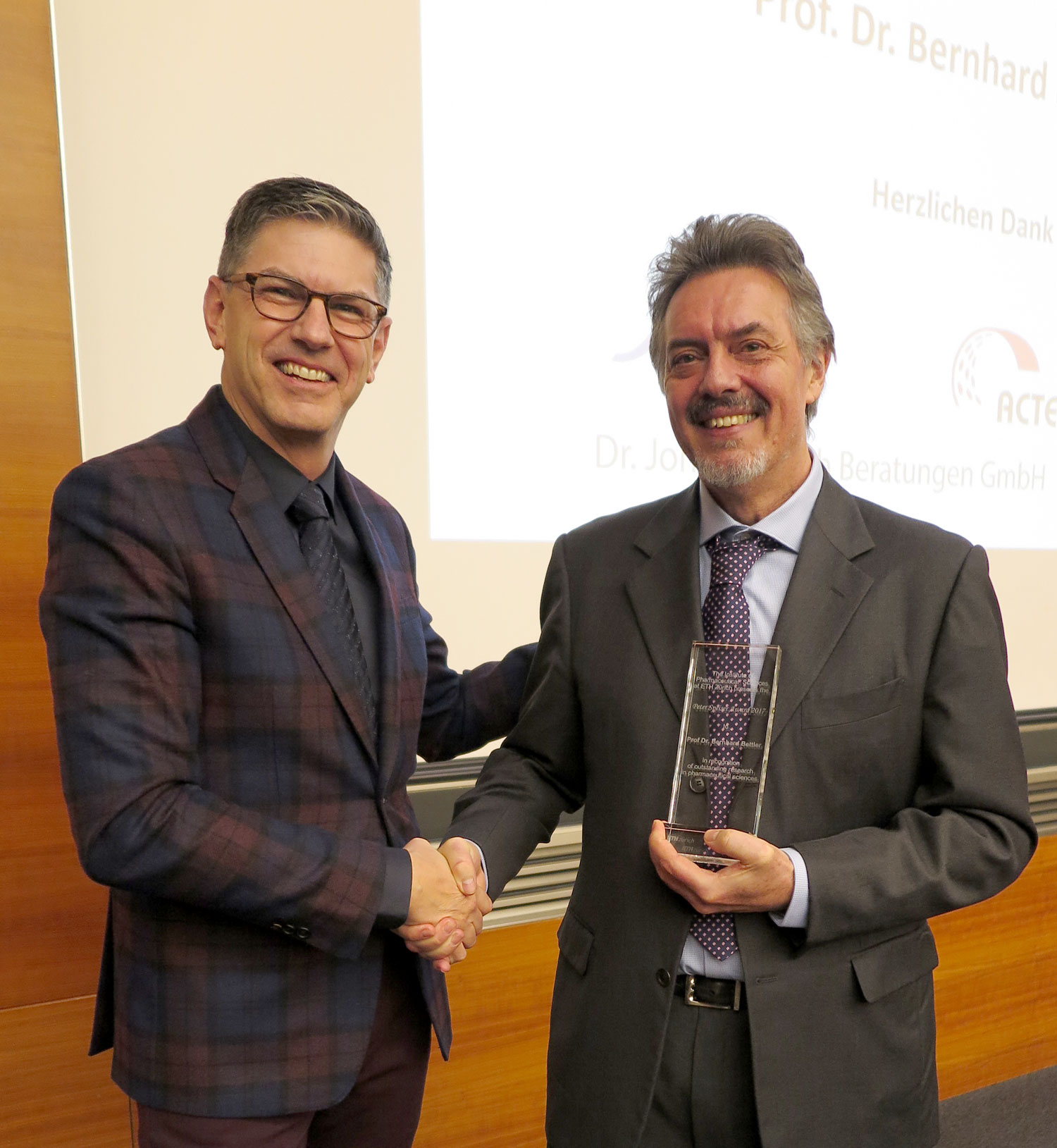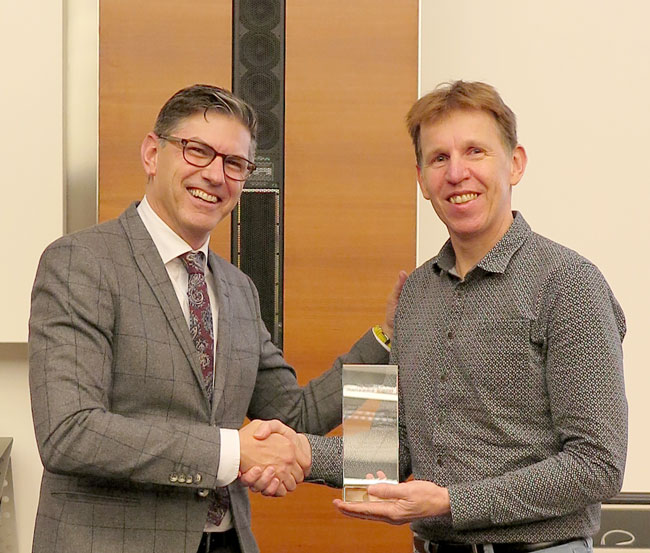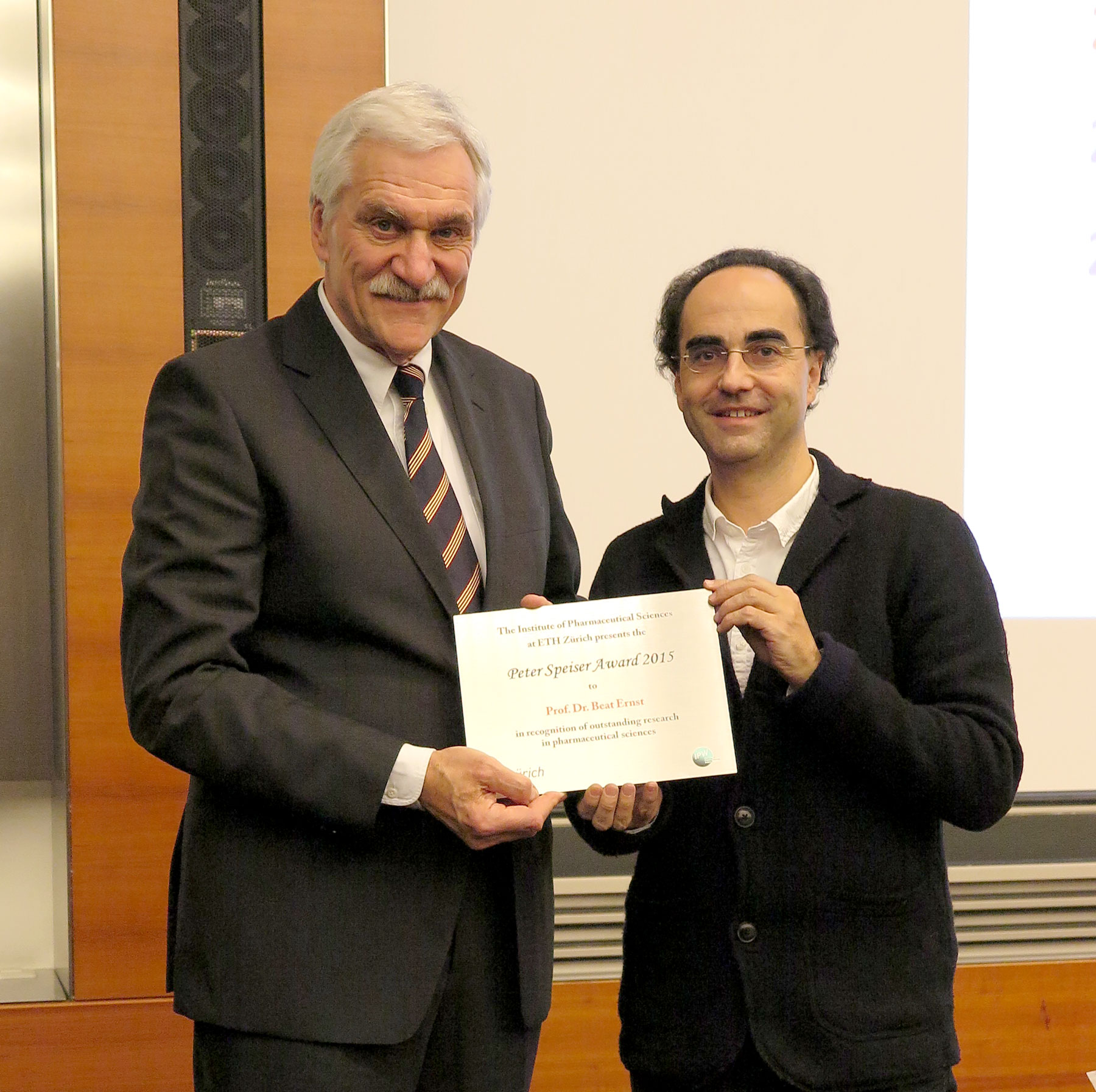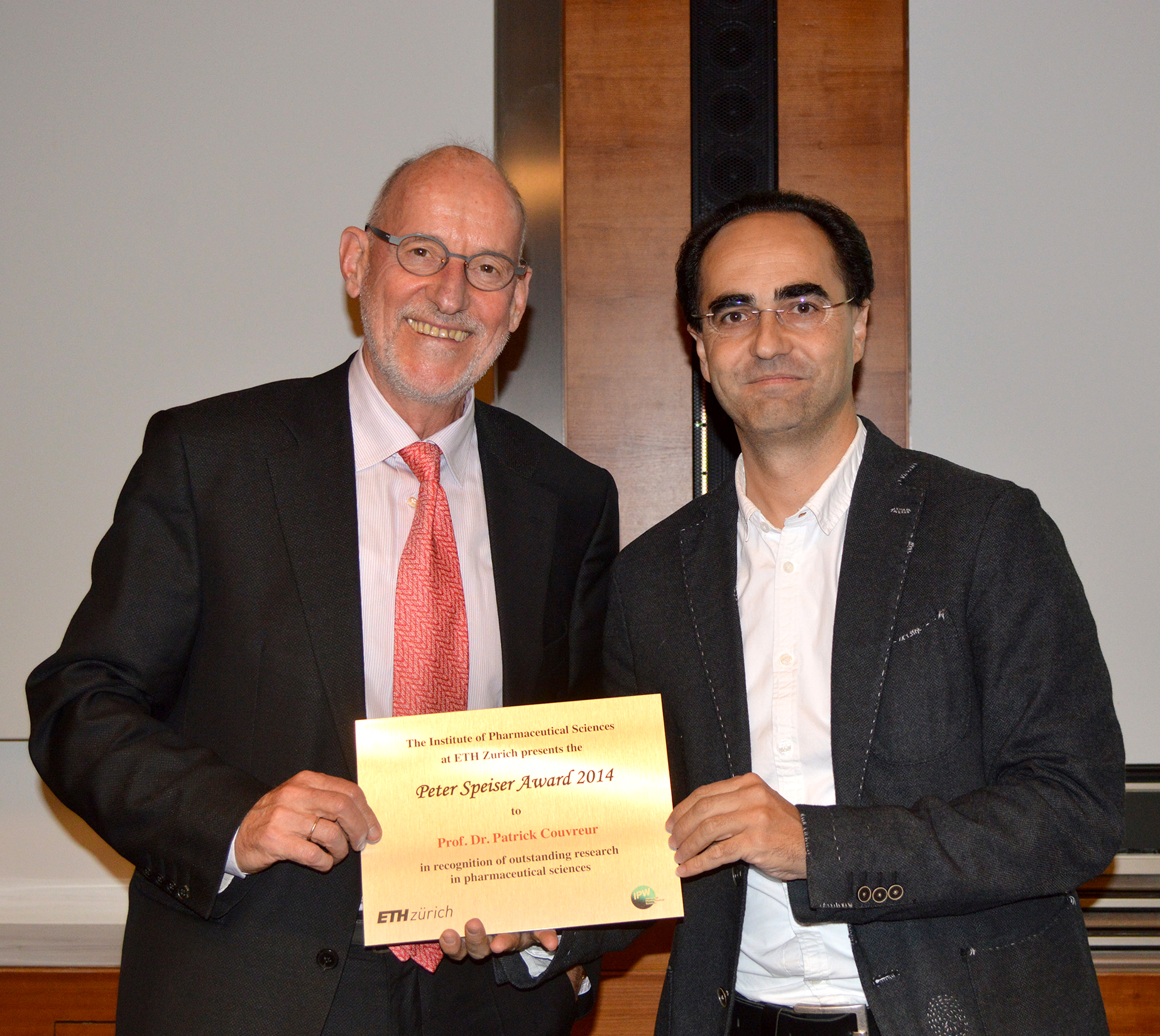Peter Speiser Award
In honor of the great scientific heritage of Prof. Dr. Speiser, the Institute of Pharmaceutical Sciences of ETH Zurich confers this prestigious award to scientists who contributed greatly to the progress of pharmaceutical sciences.
It commemorates Dr. Peter Speiser, a prominent pharmaceutical scientist who was professor of drug formulation and delivery at the ETH from 1961 to 1988, and is considered today as a pioneer in the field of nanomedicine.
Winner 2022
Prof. Dr. Katalin Karikó is a professor at University of Szeged (Hungary) and Perelman School of Medicine, University of Pennsylvania (USA). She delighted us with her talk about "Developing mRNA for therapy". The Institute of Pharmaceutical Science is proud to announce the 7th recipient of the Peter Speiser Award for outstanding achievements in the pharmaceutical sciences.
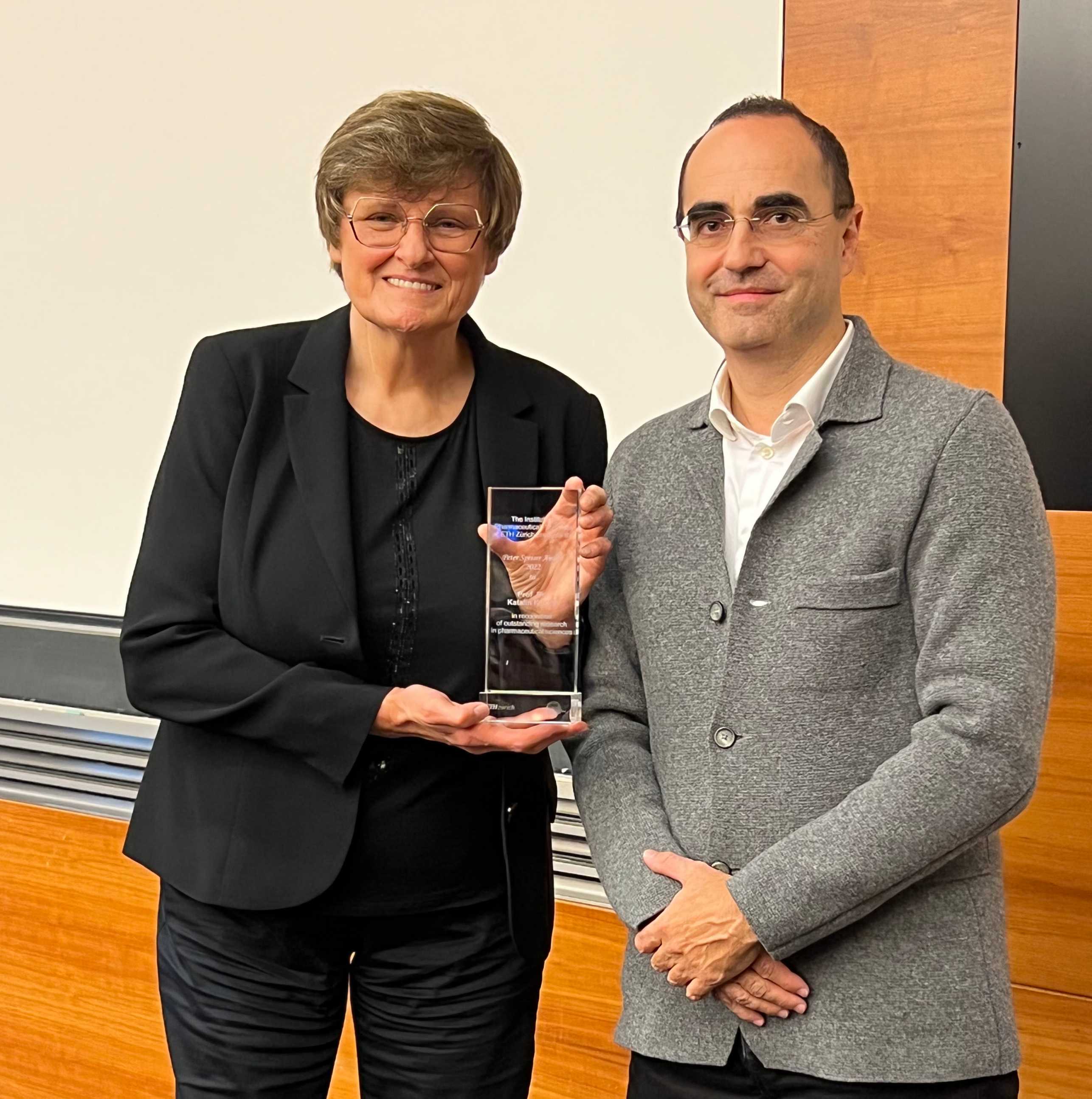
Dr. Katalin Karikó guided us through synthetic mRNAs as a new class of therapeutic agents. She started to look into mRNA as a drug platform in the 1990s, and was able to reduce concerning immune response by modifying uridine nucleotide. The resulting "pseudouridine" is considered as one of the essential components of the RNA technology to ensure its successful use.
Prof. Dr. Katalin Karikó
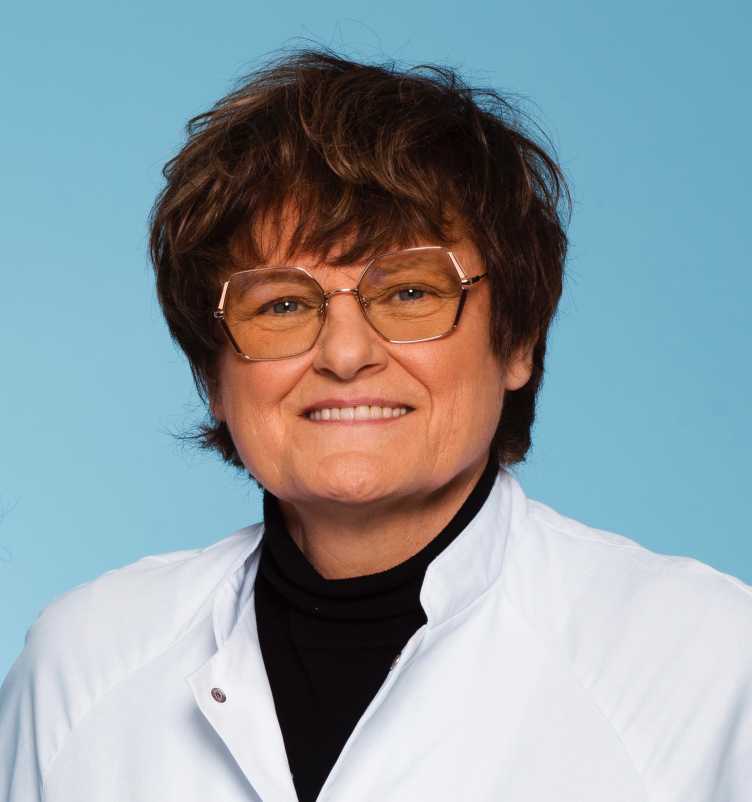
Katalin Karikó was a senior vice president at BioNTech SE, Mainz, Germany from 2013 until Oct-2022. She is also an adjunct professor at the Perelman School of Medicine, University of Pennsylvania, where she worked for 24 years. She is a professor at University of Szeged, Hungary where she received her PhD in biochemistry in 1982. For four decades, her research has been focusing on RNA-mediated mechanisms with the ultimate goal of developing in vitro-transcribed mRNA for protein therapy. She investigated RNA-mediated immune activation and co-discovered that nucleoside modifications suppress immunogenicity of RNA. This groundbreaking work unlocked the opportunity for the therapeutic use of mRNA. She co-founded and served as CEO of RNARx, a company dedicated to develop nucleoside-modified mRNA for therapy. Her patents, co-invented with Drew Weissman on nucleoside-modified uridines in mRNA, are used to create the COVID-19 mRNA vaccines by BioNTech/Pfizer and Moderna/NIH. For her achievement she received many prestigious awards, including the Solvay Prize, the Paul Ehrlich Award, the Japan Prize, the Reichstein Medal, the Breakthrough Prize, the Lasker Award and the Gairdner Award.
Winner 2020/2021
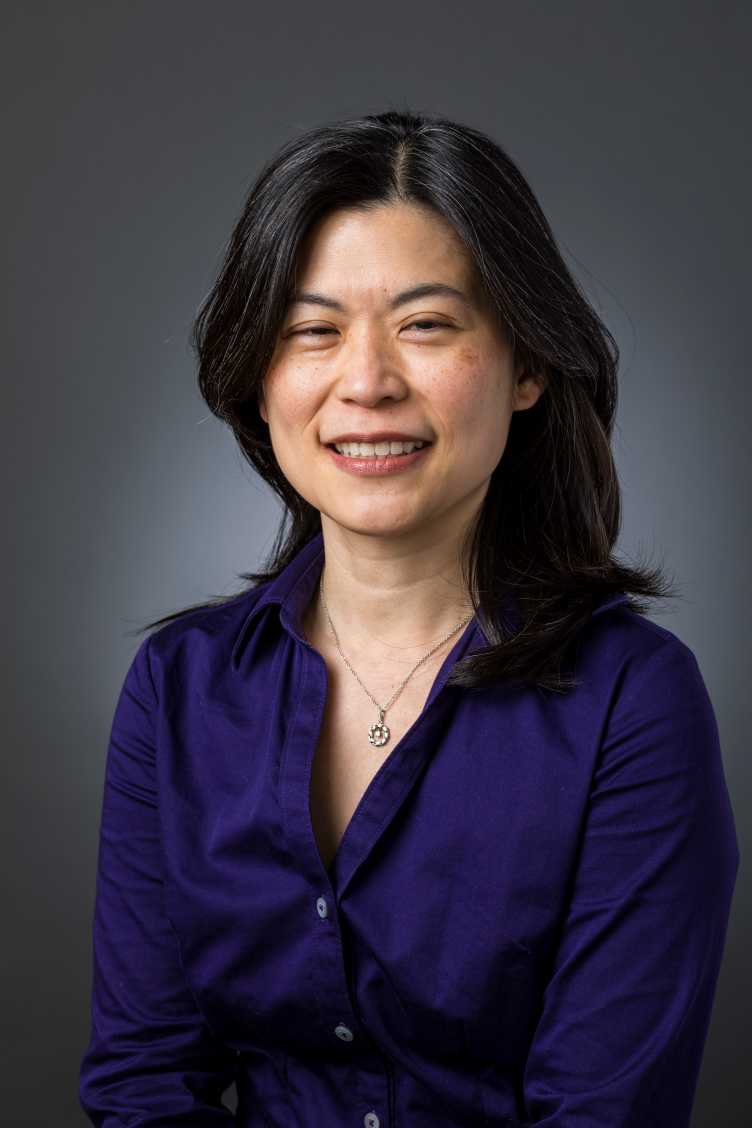
Suzie H. Pun is the Washington Research Foundation Professor of Bioengineering, an Adjunct Professor of Chemical Engineering, and a member of the Molecular Engineering and Sciences Institute at UW. She is a fellow of the U.S. National Academy of Inventors (NAI) and American Institute of Medical and Biological Engineering (AIMBE), and was been recognized with MIT Technology Review’s “Top 100 Young Innovators” designation, the Presidential Early Career Award for Scientists and Engineers in 2006, the 2014 Young Investigator Award from the Controlled Release Society, and as an AAAS-Lemelson Invention Ambassador in 2015. She was recently recognized in 2018 with the University of Washington’s Marsha Landolt Distinguished Graduate Mentor Award for her dedicated mentoring of students. She currently serves as an Associate Editor for ACS Biomaterials Science and Engineering.
Suzie Pun received her B.S. in Chemical Engineering from Stanford University and her Ph.D. in Chemical Engineering from the California Institute of Technology. She also worked as a senior scientist at Insert Therapeutics/Calando Pharmaceuticals developing polymeric drug delivery systems before joining the Department of Bioengineering at University of Washington. Her current work focuses on biomaterial applications in drug delivery and gene and cell therapy.
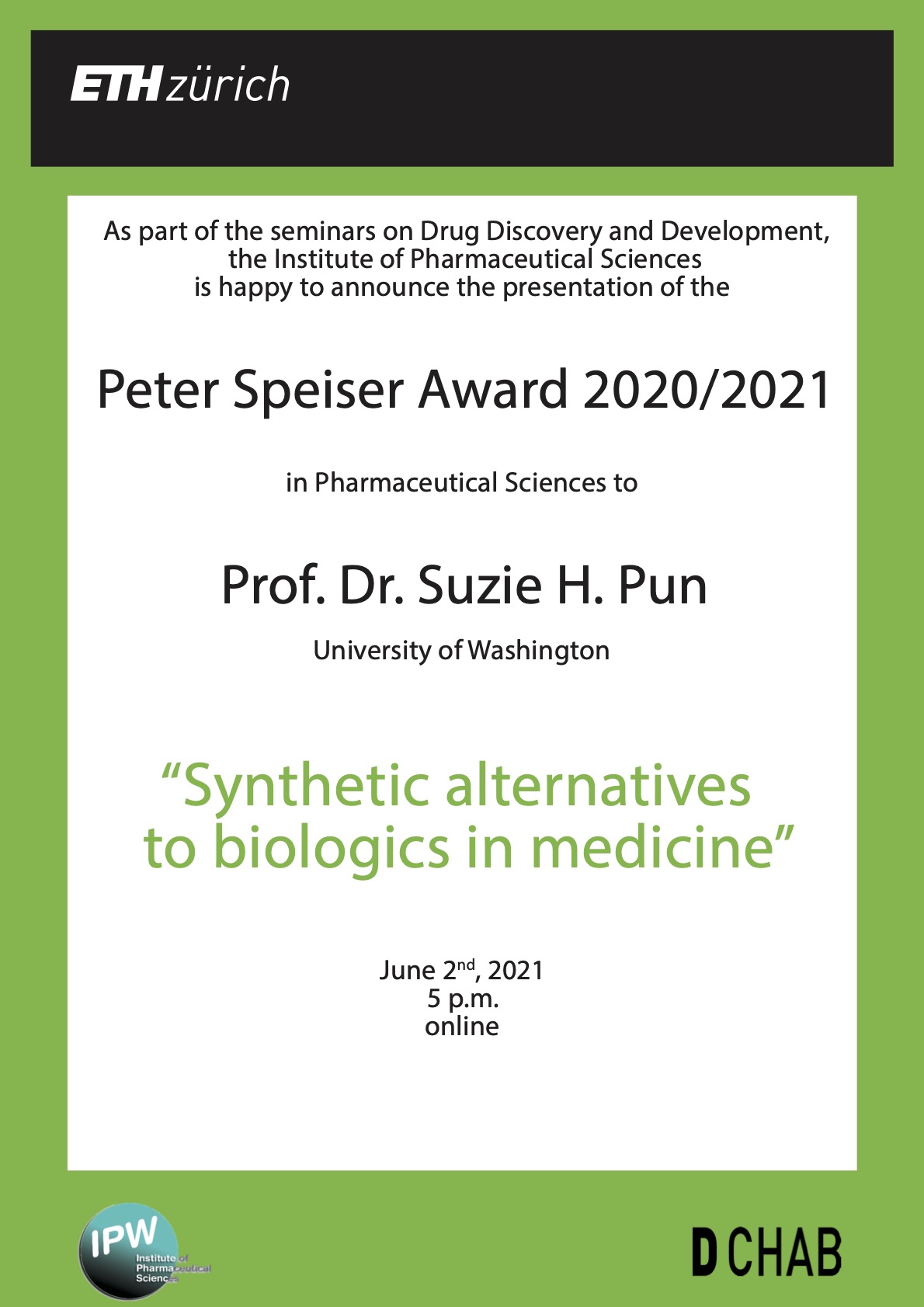
Design of synthetic alternatives to biologics in medicine
Biologics, products produced from living organisms, have revolutionized treatment of disease. Examples of FDA-approved biologics include therapeutic proteins (e.g. blood clotting factors and antibodies), engineered viruses for gene therapy, and cell therapies. Biologics are addressing previous unmet medical needs, but are challenging to manufacture and therefore high in cost. In this talk, I will describe our efforts to develop synthetic alternatives to biologics used in medicine. In the first example, a multivalent polymer displaying a fibrin-binding peptide was developed as a synthetic alternative to recombinant proteins used in trauma medicine. The second example, a polymer that facilitates intracellular delivery of nucleic acids and peptides was synthesized based on design principles learned from adenoviral vectors. In a final example, a unique aptamer with high affinity for T cell marker CD8 was discovered and applied as an alternative to antibodies for T cell isolation in the manufacturing process for CAR T cells.
Winner 2019
Adrian R. Krainer, Ph.D. is the St Giles Foundation Professor and Deputy Director of the Cancer Center at Cold Spring Harbor Laboratory (Long Island, NY)
The Institute of Pharmaceutical Science is proud to announce the fifth recipient of the Peter Speiser Award for outstanding achievements in the pharmaceutical sciences known. (Download Invitation Peter Speiser Award 2019 - jpg (JPEG, 205 KB))
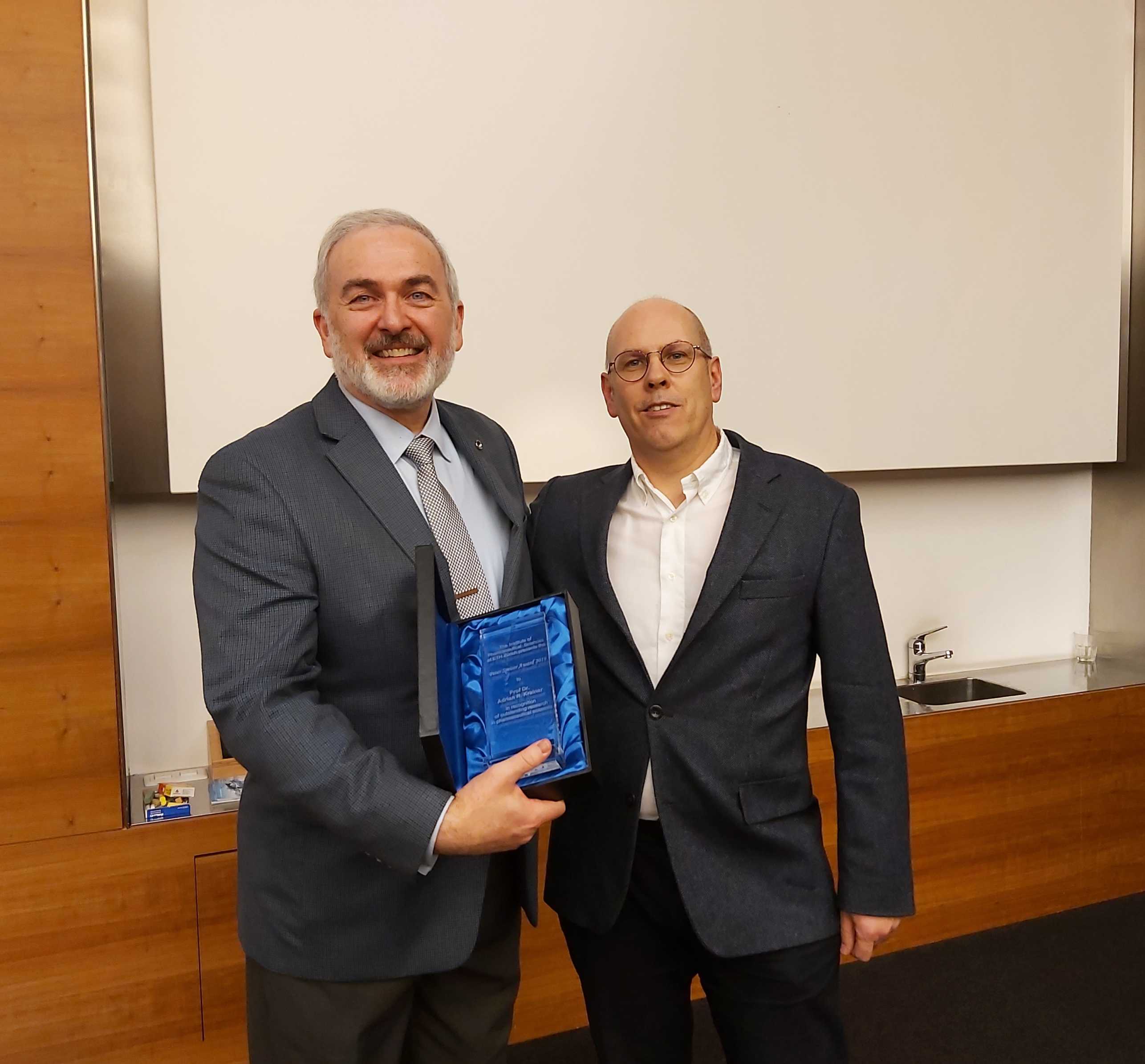
Prof. Dr. Adrian R. Krainer is the St Giles Foundation Professor and Deputy Director of the Cancer Center at Cold Spring Harbor Laboratory (Long Island, NY)
Prof. Dr. Adrian R. Krainer
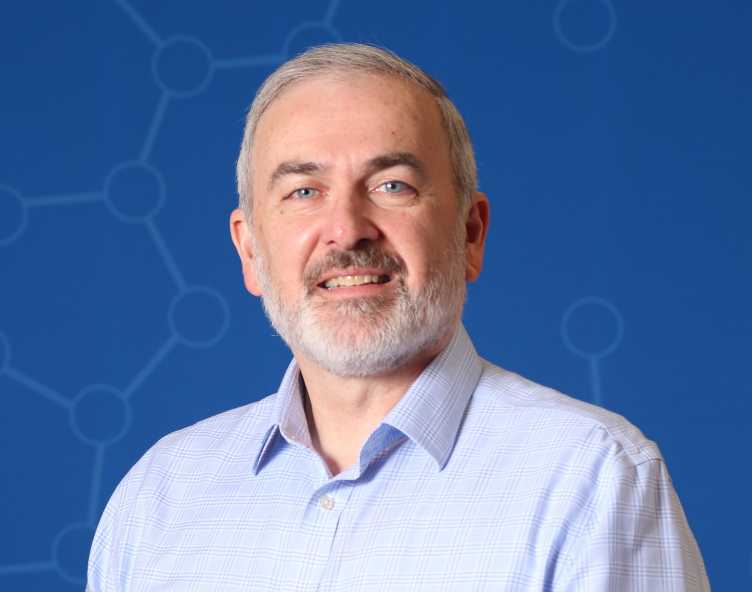
Adrian R. Krainer, Ph.D. is the St Giles Foundation Professor and Deputy Director of the Cancer Center at Cold Spring Harbor Laboratory (Long Island, NY). He received BA and PhD degrees in Biochemistry from Columbia University and Harvard University, respectively. Prof. Krainer is a researcher in the field of RNA splicing, and an inventor of the RNA-targeted antisense therapeutic Spinraza, the first approved drug to treat the neurodegenerative disease spinal muscular atrophy. He has published over 200 scientific articles and holds 7 US patents and 83 foreign patents that have been licensed or sublicensed to 3 companies. He is a founder and Director of Stoke Therapeutics. He is the recipient of the 2019 Life Sciences Breakthrough Prize, the 2019 RNA Society Lifetime Achievement Award, the 2019 KJ Zülch Prize in Basic Neurological Research, the 2019 Bermuda Principles Award, the 2018 Brandwein Award in Genetic Research, the 2017 FE Bennett Memorial Award of the American Neurological Association, and an honorary doctorate from Tel Aviv University. Prof. Krainer is a fellow of the American Academy of Arts & Sciences, the National Academy of Inventors (USA), and the Royal Society of Medicine (UK).
Winner 2018
Prof. Dr. Philip S. Low, Ralph C. Corley Distinguished Professor of Chemistry and Director of the Purdue Center for Drug Discovery, Purdue University
The Institute of Pharmaceutical Science is proud to announce the fourth recipient of the Peter Speiser Award for outstanding achievements in the pharmaceutical sciences known. (Download Invitation Peter Speiser Award 2018 - jpg (JPEG, 1.5 MB))
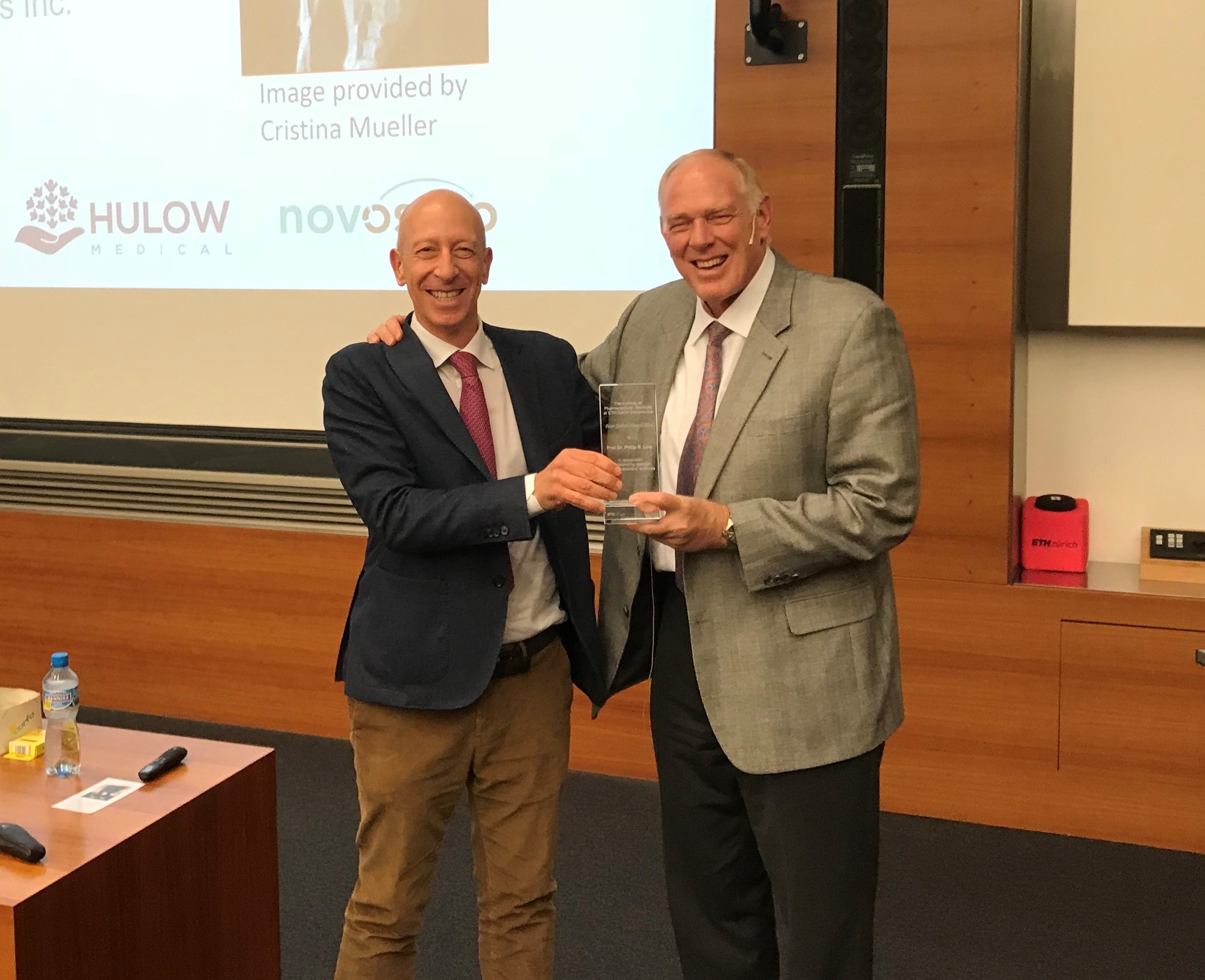
Prof. Dr. Philip S. Low, Ralph C. Corley Distinguished Professor of Chemistry and Director of the Purdue Center for Drug Discovery, Purdue University
Prof. Dr. Philip S. Low

Dr. Philip Low’s research focuses on the development of targeting ligands for the selective delivery of imaging and therapeutic agents to diseased cells; i.e. thereby avoiding the collateral toxicity and image ambiguity that can arise when nontargeted agents enter healthy cells. In the case of cancer, Dr. Low has achieved this specificity by identifying cell surface proteins that are upregulated on malignant cells, but absent or expressed in limited numbers on healthy cells.
Following i.v. injection, these ligand-targeted imaging/therapeutic agents accumulate in the diseased cells and clear in <3 hours from healthy tissues. To date, Dr. Low’s lab has developed targeting ligands for most human cancers, as well as for a variety of infectious, inflammatory and autoimmune diseases. Five of his ligand-targeted cancer drugs are currently undergoing human clinical trials for kidney, ovarian, breast, lung, brain, prostate, and endometrial cancers, and others are in the clinical trials for sickle cell disease, malaria, and a variety of autoimmune diseases. While several disease-specific ligands are exploited to deliver therapeutic drugs, others are used to target 99mTc and PET imaging agents, while still others have been developed to target fluorescent dyes specifically to cancer cells for intra-operative fluorescence-guided surgery. More recently, other targeting ligands have been designed to image nonmalignant cells (e.g. TAMs, MDSCs, CAR T cells, etc.) that affect tumor growth and survival within the tumor microenvironment.
In an effort to communicate these findings to others, Dr. Low has published over 450 refereed articles that have generated an H factor of >100. He has received an NIH MERIT Award, the American Chemical Society’s Award for Cancer Research (Sovnosky Award), the American Association for Cancer Research (AACR) Award for Chemistry in Cancer Research, and many other international and national awards. Dr. Low is a member of the National Academy of Inventors and a Fellow of the AAAS and he serves on several Boards of Directors and Scientific Advisory Boards. To help commercialize his >70 patents, he has founded four companies (Endocyte Inc., On Target Laboratories LLC, HuLow LLC, and Novosteo Inc.) that remain highly successful.
Winner 2017
Prof. Dr. Bernhard Bettler, University of Basel
The Institute of Pharmaceutical Sciences is proud to announce the fourth recipient of the Peter Speiser Award Prize for outstanding achievements in the pharmaceutical sciences known. (Download Invitation Peter Speiser Award 2017 (JPEG, 288 KB))
In 1989 he joined Steve Heinemann at the Salk Institute in San Diego and was involved in the cloning of the AMPA-, kainate- and NMDA-type glutamate receptors, which underlie memory formation in the brain. Bernhard Bettler carried out experiments showing that kainate and AMPA receptors are distinct from each other and contribute to excitotoxicity, a phenomenon that leads to neuronal death during epileptic seizures and ischemia. In 1994, Bernhard Bettler returned to Ciba (later Novartis) to head drug discovery projects in the Nervous System Department. In 1997, his laboratory reported the cloning of the GABAB receptors, which are implicated in mental health disorders. Bettler’s laboratory showed that GABAB receptors need two distinct subunits to be active, which represented the first demonstration that G-protein coupled receptors form heterodimers with unique properties. To date, there are more than 100 examples of heterodimeric G-protein coupled receptors, many of which are targeted in drug discovery programs.
In 2001, Bernhard Bettler joined the Medical Faculty of University of Basel. He is a member of the executive committee of the Department of Biomedicine, which unites the biomedical laboratories of the Faculty of Medicine. In his latest work Bettler’s laboratory revealed that the molecular complexity of GABAB receptors is increased through association with trafficking, effector and regulatory proteins. His current research interests are at the interface between physiology, pharmacology and cell biology, with a focus on trying to understand where particular receptor complexes operate in neuronal networks. In collaboration he attempts to exploit knowledge on the composition of receptor complexes for drug discovery.
Winner 2016
Prof. Dr. Ton Schumacher, The Netherlands Cancer Institute, NKI
The Intitute of Pharmaceutical Science is proud to announce the third recipient of the Peter Speiser Prize for outstanding achievements in the pharmaceutical sciences known. (Download Invitation Peter Speiser Award 2016 (PDF, 340 KB))
After a brief stint as a post-doc in the laboratory of Hidde Ploegh at the Massachusetts Institute of Technology, he joined the group of Peter Kim at the Whitehead Institute in Cambridge, USA in 1994. In 1996 he joined The Netherlands Cancer Institute, where he is currently Senior Member, to study the development of T cell immunity through biotechnological approaches. Ton Schumacher is recipient of amongst others a Pioneer Award and Amsterdam Inventor Award, is EMBO member, and is recipient of an ERC AdG and SU2C Dream Team Award.
Mission statement
There is now abundant clinical evidence that the T cell-based immune system can control the growth of human cancers. My ambition is three-fold: 1). To develop novel technologies that can be utilized to understand how T cells recognize human cancers; 2). To exploit these technologies to reveal the mode of action of clinically used immunotherapies; 3). To use the resulting knowledge to design more specific and more effective, immune interventions.
Key discoveries
1). Developed technologies to measure which fragments from (tumor) antigens bind to MHC molecules. These technologies have subsequently been adopted world-wide; Used these technologies to describe the ligand preference of MHC molecules (selected references: Schumacher, Cell 1990; Schumacher, Nature 1991).
2). Provided the first in vivo proof of principle for the potential value of T cell receptor gene therapy to induce defined tumor-specific T cell responses; Described potential safety issues, and described technology to develop collections of TCR genes that can be used for clinical development (selected references: Kessels, Nat Immunol 2001; Bendle, Nat Med 2010; Linnemann, Nat Med 2013; Strønen, Science 2016).
3). Developed the concept of cellular barcoding to reveal single immune cell behavior in vivo; Used this technology to reveal fundamental aspects of immune responses (selected references: van Heijst, Science 2009; Naik, Nature 2013; Gerlach, Science 2013; Perié, Cell 2015).
4). Developed high-throughput technology to measure T cell responses to patient-specific T cell antigens; Demonstrated how T cell responses against patient-specific neo-antigens are common in melanoma patients and can be enhanced by immunotherapy (selected references: Toebes, Nat Med 2006; Hadrup, Nat Methods 2009; van Rooij, J Clin Oncol 2013; Rizvi, Science 2015; Linnemann, Nat Med 2015; Verdegaal, Nature 2016).
Award Winner 2015
Professor Dr. Beat Ernst (09/12/2015)
The Institute of Pharmaceutical Sciences proudly presents the secound recipient of the Peter Speiser Award for outstanding scientific achievements in pharmaceutical sciences.
09.12.2015, Prof. Dr. Beat Ernst
Prof. Dr. Beat Ernst has been a professor of Molecular Pharmacy in the Department of Pharmaceutical Sciences at the University of Basel since 1998.
Beat Ernst’s research interests are at the interface between carbohydrate chemistry and glycobiology, with a particular focus on the synthesis of glycomimetics and their pharmacological profiling.
Professor Dr. Beat Ernst studied chemistry at the ETH Zürich, where he also completed his Ph.D. in the area of tricyclic hydrocarbons supervised by Proff. Oskar Jeger and Camille Ganter. He spent the following two years as a post-doctoral associate at the California Institute of Technology, Pasadena, CA, in the research group of Prof. Robert E. Ireland, where he synthesized Tirandamycin C, a member of the tetramic acid family of natural products. In 1991, he joined Ciba-Geigy’s Central Research Laboratories in Basel, where he first worked on small ring compounds and later on carbohydrates and the design of glycomimetics thereof as potential drug candidates. After his promotion to section head Carbohydrate Chemistry and Biology in 1992, he initiated the Selectin program. In 1997, he moved to Transplantation Research within Novartis Pharma AG, which had been formed through the merger between Ciba-Geigy and Sandoz.
Beat Ernst received the Werner Prize of the Swiss Chemical Society in 1991, became Ciba Fellow for his contributions to natural product synthesis in 1993, and was awarded with the Phoenix Pharmacy Science Award in 2013. In addition, he has received various teaching awards, including the MedidaPrix (the European academic award for media didactics) and the LernTechNet Prize (from the University of Basel), both in 2003.
Beat Ernst’s research interests are at the interface between carbohydrate chemistry and glycobiology, with a particular focus on the synthesis of glycomimetics and their pharmacological profiling. His research on one hand aims at understanding the conformational and structural requirements for biological activity of glycomimetics, and on the other hand, in collaboration with academic and industrial groups, he explores the therapeutic potential of such compounds in disease models, and in one case, in the clinic (Rivipansel, currently in clinical phase III for the treatment of sickle cell disease) with the ultimate goal to discover new therapeutics.
Award Winner 2014
Professor Patrick Couvreur ( 11/12/2014 )
The Institute of Pharmaceutical Sciences presents the first recipient of the new Peter Speiser Prize for outstanding achievements in the field of pharmaceutical sciences.
12.11.2014, Prof. Dr. Patrick Couvreur
The Institute of Pharmaceutical Sciences proudly presents the first recipient of the new Peter Speiser Award for outstanding scientific achievements in pharmaceutical sciences.
Prof. Dr. Patrick Couvreur is Full Professor of Pharmacy at the Paris-Sud University and holder of the chair of “Innovation Technologique” (2009-2010) at the prestigious « Collège de France ».
Prof. Dr. Patrick Couvreur is appointed as a Senior Member of the “Institut Universitaire de France”. His contributions in the field of drug delivery and targeting are highly recognized around the world with more than 490 peer review research publications (H-index 75 and over 21,000 citations). His research is interdisciplinary, at the interface between Physico-Chemistry of Colloids, Polymer Chemistry, Material Science, Molecular and Cellular Biology and Experimental Pharmacology in oncology and neurosciences. Patrick Couvreur’s research has led to the funding of two start-up companies (Bioalliance and Medsqual) and one nanomedicine issues from his research is currently in phase III clinical trials. His appointment as a member of six academies (Académie des Technologies, Académie de Médecine and Académie de Pharmacie in France, as well as the Académie Royale de Médecine in Belgium, the Royal Academy of Pharmacy in Spain and the US National Academy, Institute of Medicine in USA) is another recognition of major scientific and scholarly contributions of Patrick Couvreur.
